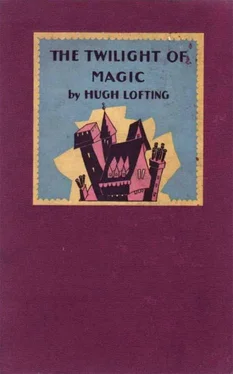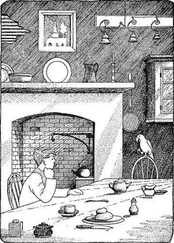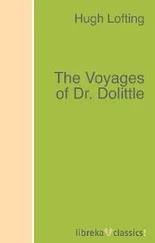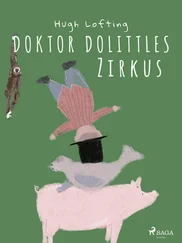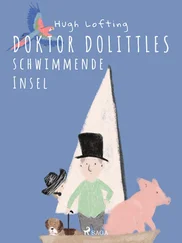Chapter IX – Chemistry and magic
Tap-Tap! ... Tap-Tap!
It was the children knocking on the cabin door next morning. They were not kept waiting long. Almost before the fourth tap had struck it, the door flew open, as if by magic. There stood the philosopher, a terrible frown upon his very red face. In his right hand, thrust out to them, he held the shell.
‘Here it is,’ he said. ‘Take it and never let me see it again!’
There was a bang of the door slamming to. And the youngsters again stood alone outside. Speechless with surprise, they stared at one another across the shell that lay, where the philosopher had thrust it, in Giles’s hand.
Then, dreadfully disappointed, they turned away from the cabin. After such a welcome there was nothing else to do but leave. They had not walked more than fifty paces, however, before they heard a voice call them. Turning about they saw the figure of Johannes standing on his threshold again.
‘Forgive me, children,’ said he when they had returned to him. ‘Forgive me if I allowed my temper to get the better of me. I cannot have you go away like this. Hospitality, good manners—well, maybe I’ve forgotten all about them, living alone so long. Come in again and let me talk further with you.’
Neither Giles nor his sister had ever before been spoken to in such a manner by any grown-up person, much less by a philosopher, a learned professor of mathematics, chemistry and heaven knows what other sciences.
‘It’s my own fault—entirely my own fault!’ Johannes kept muttering as he led the youngsters back into the cabin and closed the door. ‘I was tempted. Yes ... Like any fool I was tempted—Bah! My own fault!’
And he stirred the fire so roughly that sparks and coals flew everywhere.
‘But, Sir,’ said Anne gently, ‘how do you mean—your own fault? What has happened? What harm’s been done?’
Almost savagely the philosopher turned from the fire and faced her, the poker in his hand. He looked for a moment like some red demon about to spring upon an enemy.
‘What harm?’ he yelped. ‘You’ve ruined my peace—you and your shell ... There, there! You didn’t mean to, I know. ‘Twas I should have known better. But, but—but—Poof! But, but’ (he spluttered almost like a rain-soaked candle) ‘how could I know the wretched thing would really work?’
‘Well,’ said Anne very, very softly, ‘we told you it was peculiar, you know.’
‘Yes, yes,’ muttered the philosopher as he wiped his forehead of the sweat caused by the fire’s heat and his own fussing. ‘You knew more than I—I with all my studying and labour. There’s no science in it, no chemistry, no natural law, no sense whatever, and yet it works. If I were not a chemist I would call it magic, I suppose ... Well, the greatest thinkers have warned us not to be proud of our little knowledge.’
‘Then you mean to say that something happened, Sir,’ said Giles, coming forward eagerly. ‘You—you did hear voices?’
Again Johannes mopped his brow while with his poker he made another attack upon the fire, jabbing it viciously.
‘Yes,’ he said at last. ‘I heard. I heard all the other scientists and alchemists and philosophers—all over the world—saying what they thought of my last book. And they didn’t say one single decent thing. All bad. All bad ... Jealousy, that’s what it is. At first I wouldn’t listen and I laid the shell down upon a stool and went on with my work. Because, after all, what do I care what the silly dummies say? I know when I am right, don’t I? Then, unthinkingly, I sat down upon the stool and the shell was hot and burnt me—or I thought it had. And I knew that someone else was talking about me. I wondered if perhaps this time it might be something good, of scientific value, you know. So I took it up.’
A third time the philosopher wiped the perspiration from his excited, ruddy face.
‘I hadn’t meant to listen long,’ he continued, waving the poker desperately in the air. ‘And I wouldn’t have done, only I heard old Hieronimus, the astronomer of Arles, talking about my theory of atmosphere and light. He is no fool, is Hieronimus of Arles—usually. And so I was tempted, and listened on and on. I couldn’t understand or explain how it was being done. But I wondered if some day scientists would come to look on this as an everyday, usual thing—a voice speaking across hundreds of leagues from one man to another, with nothing connecting them but the common air between. Well, there they were: Hieronimus discussing my work with two charlatan quacks who clearly considered themselves learned doctors of high degree. This theory of air and light, mark you, I had spent years of work on, and had set it forth fully in my last book. I know I am right. I can prove it. It wouldn’t have been so bad if I could have talked back to them through the shell. But there I had to sit, hearing them chatter and twaddle on, getting farther and farther from the real truth all the time. Again and again I laid the shell aside and tried to work. But all the time I found I was arguing with them in my mind and mixing my chemicals and figures into a hopeless jumble. And I kept going back to listen for some more—like a half-wit. The result is, I haven’t done a stroke of decent work since you left. You’re just in time to save me from going completely crazy. Take it away now. Ah, what a relief it’ll be to have it out of reach! Take it, quick, before the wretched thing gets hot again. I can’t trust myself. I should have known better—So should Hieronimus. Get out, my dears. Good-bye!’
So great was the philosopher’s haste to be rid of them, that Giles and Anne found themselves bundled like potatoes out upon the turf before the door.
On the way home they consoled themselves by gathering the blackberries that now grew, plentiful and ripe, on the heath that covered the hills. They had had more than enough of the Whispering Shell for the present and did not speak of it again till they reached the town.
Passing through the market-place they were hailed by Luke the Lame Boy.
‘What’s the matter?’ he cried. ‘Such glum faces—and all covered in blackberry juice! Why so sad?’
Then Anne, remembering Agnes’s great trust in this lad, told him how they had a shell which let you hear what people were saying about you. And Giles broke in to explain how they had tried it on two people and neither of them wanted to keep it. And Anne told Giles not to interrupt and went on with what she had to say.
‘You see, Luke, one of these people didn’t have anyone talking about him; and the other had folks talking about him no end, but the things they said upset him and kept him from doing his work.’
‘Look, Luke,’ said Giles. ‘Here is the shell. Isn’t it a beauty?’
The lame boy looked down at the green thing shining and flashing in Giles’s hand. Then he turned away with a shrug.
‘Well, for my part, neither would I want it,’ said he.
‘Why?’ asked Anne.
‘Because I know, already, what people say about me.’
Suddenly Giles felt his sister nudge him—apparently to keep him from asking any further questions. Awkwardly they bade the lame boy farewell and proceeded on their way. Anne glanced back over her shoulder to make sure they were beyond Luke’s hearing before she spoke again.
‘I don’t know how I could have been so thoughtless,’ said she when they had reached the far side of the market-place. ‘Of course, the poor boy knows already what people say of him.’
‘Yes,’ sighed Giles, nodding seriously. ‘ “Ugly little imp! Misshapen little brat!”—and so on. Poor Luke! They are a heartless lot, the children of this town. I’d like to punch their heads when I hear them teasing him. Well, it doesn’t seem to me that we have got any farther with our shell, Anne. It’s not so wonderful. Maybe, after all, it doesn’t matter what people say about one?’
Читать дальше
